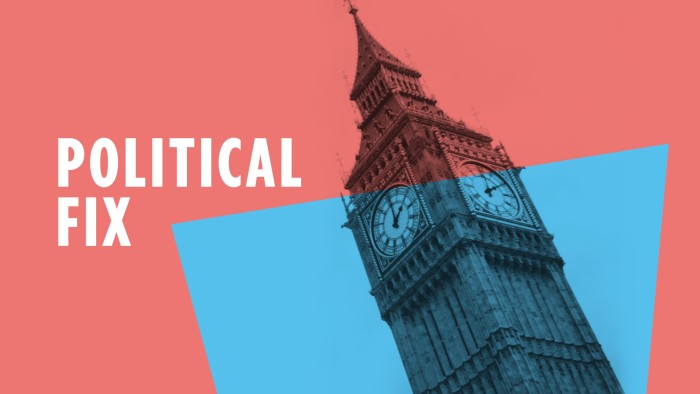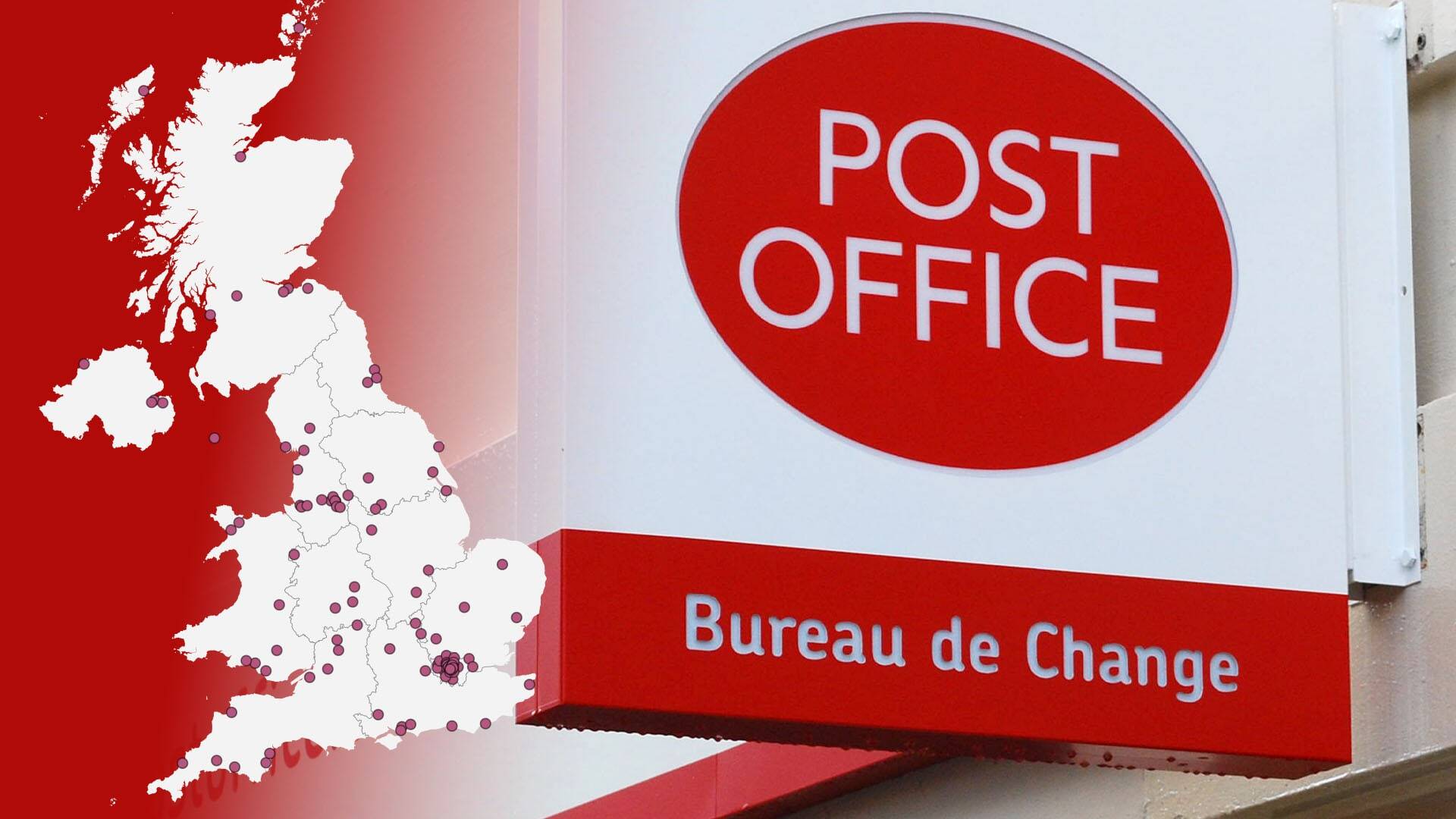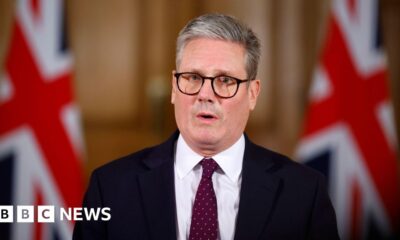This is an audio transcript of the Political Fix podcast episode: ‘The UK in Trump’s world’
Ed Luce
I think Trump will challenge Keir Starmer’s flexibility and adaptability. But it could turn out to be an opportunity for the UK.
Lauren Fedor
I think the name of the game is uncertainty. Anything is possible.
Jim Pickard
Chaos. It will be seismic in ways that we cannot predict greatly.
[MUSIC PLAYING]
Lucy Fisher
Hello and welcome to Political Fix from the Financial Times with me, Lucy Fisher. Well, what a week. Donald Trump is back. America has spoken and we’ll be asking what the incoming Republican president means for the UK and the wider world. Plus, the new Tory leader Kemi Badenoch has picked her top team, held her first shadow cabinet meeting and embraced her debut appearance against Keir Starmer at prime minister’s questions.
To dissect all this and more, I’m joined by Political Fix regular Jim Pickard. Hi, Jim.
Jim Pickard
Hey, Lucy.
Lucy Fisher
And you’re joining down the line, Jim, after a heroic football injury last night while playing with some fellow lobby journalists.
Jim Pickard
I’m manfully struggling on.
Lucy Fisher
And from Washington, DC, we’re joined by our US national editor and columnist Ed Luce. Hi, Ed.
Ed Luce
Hi, great to be with you.
Lucy Fisher
And our deputy Washington bureau chief Lauren Fedor. Hi, Lauren.
Lauren Fedor
Hi, Lucy.
[MUSIC PLAYING]
Lucy Fisher
Well, thanks in particular to YouTube when I’m sure you’ve not had very much sleep in recent days. So to kick off, Ed and Lauren, help us understand the choice that America has made for the second time. I think it’s fair to say that there’s a level of surprise and perplexity in large quarters of the UK about America’s backing for Trump and such emphatic backing. Ed, what’s your take on how Trump won or Harris lost?
Ed Luce
I mean, it is a shock, even though it’s technically within the margin of error of the too-close-to-call polls they’ve been having for months. It is a shock because people always assumed — and until now, it had been the case — that Trump’s ceiling was not much higher than his floor, roughly 47 per cent of America. That’s been shattered. A majority, it looks like, 50 per cent or a little bit more in decimal points has voted for Trump. And he’s got not just a majority of the popular vote but obviously a big, a thumping electoral college majority. So a lot of those assumptions are just being torn up.
I think the fact that it’s not just the white working class who are voting for Trump but almost half of Hispanic males between a fifth and a quarter of African American males. This is an extraordinary moment for the Democrats. It’s seismic, an overused word, but they are no longer a party of the working class, even the multiracial working class. That’s a shock.
Lucy Fisher
Lauren, what’s your take?
Lauren Fedor
Well, look, if we pick up where Ed left off on the Democrats, there are a couple, to say the least, of factors here. One is that Kamala Harris was not able to pitch herself as the change candidate, and the electorate wanted a change. They were not happy with the Biden administration, particularly on the economy. And that shows in the results.
I think Ed’s point though about the broader Democratic party brand and the problems that they face, particularly with the working class, are deep-seated and structural and problems that the party is gonna need to wrestle with if they wanna start winning elections, whether it be in the midterms in two years, or figuring out, you know, who they want to rally against and what their message should be four years from now. And when it comes to that, it’s not only economic issues, I think it’s also social issues. With some of these demographics, the Democratic party is seen as moving way too far to the left on social issues. And so it’d be very interesting, I think, to see in the years to come whether or not the party moves back towards the centre.
Lucy Fisher
Really interesting from you both. Well, look, I think we want to focus on what Trump’s return to the White House means for Britain in particular. Jim, it was striking, wasn’t it, that Keir Starmer was very quick out of the traps to issue a statement congratulating Trump. He was one of the first world leaders to speak with him on the phone after the election. And I don’t know about you, but we get lots of these Downing Street readouts of such calls between the UK prime minister and world leaders. They’re usually quite dry and factual, But this one was gushing, wasn’t it? You know, talking about Starmer issuing a hearty congratulations, how he fondly recalled his recent dinner with Trump in Trump Tower. Have you been surprised by how fulsome Starmer has been in his congratulations?
Jim Pickard
It was that adjective, hearty, wasn’t it? I mean, when have we ever heard a British prime minister offering hearty congratulations to another world leader? I mean, they all bending over backwards to basically try and demonstrate to Washington that there’s no long-held grievances just because the Labour party is more aligned with the Democrats and because so many Cabinet ministers have said things about Donald Trump in the past which I guess look awkward through the prism of what has now happened.
I mean, you remember, Lucy, that you and I went through maybe three months ago we went back through the current British cabinet to see what various members had said about Donald Trump in the past. And the chastisements included calling him inflammatory, an ignorant sociopath, an absolute moron, a profound threat; a racist, misogynist self-confessed groper, and I can’t remember who said this one, but the worst president in history.
Now, the defence on this front is that when people like JD Vance, who is of course, gonna be the vice-president, when he’s called Trump worse things — you know, suggested that he didn’t know whether Trump was more like Nixon or like Adolf Hitler. And that gives the get-out-of jail card for the party.
But there was, of course, also that awkwardness only two weeks ago when it became pretty transparent the way that so many Labour activists have gone out to help the Democrats. And of course, that’s something that in a normal election cycle we’re used to happening, but I think someone had done a LinkedIn post making it look like this was being actively organised by the Labour party. And of course Trump’s acolytes took issue with that and kicked off. So yes, there are many reasons why Keir Starmer is bending over backwards to kiss the ring.
Lucy Fisher
And Jim, you mentioned some of those insults that have been flung at Trump by around a dozen now Labour cabinet ministers. One of the biggest critics was, of course, David Lammy. In 2018, when he was a backbencher, he called Trump a woman-hating, neo-Nazi sympathising sociopath and a profound threat to the international order. Now the foreign secretary, he too was quick out of the traps to congratulate Trump and said that the British government was looking forward to working with him.
Ed, Jim mentions how JD Vance has managed to turn around his relationship with Trump. Does Trump hold grudges? What do you make of how the sort of the current Labour administration will be able to work alongside him, given some of their past remarks?
Ed Luce
I don’t think it will have much impact at all. I mean, he does hold grudges to people who are not prepared to basically get down on their knees and apologise for them, whether it’s sort of literally or figuratively. I mean, he likes people who kiss the ring, as Jim put it.
And I think that the work you’ve seen — for example, David Lammy do before the British election here in Washington, the people in the Trumpian world that he’s cultivated and gone to see, including JD Vance before Vance was selected as Trump’s running mate, including people like Elbridge Colby, who might well become Trump’s national security advisor. Many others in that sort of heritage project, 2025-adjacent world. Lammy has been, you know, really solicitous of contacts in that world.
And you have here a British embassy under Karen Pierce, the ambassador, that is very close to Trump. They took David Cameron down there to Mar-a-Lago to help Trump change his mind on Ukraine money. So he’s an Anglophile. And, you know, regardless of what British public opinion thinks of him, which, you know, I think is very negative in line with most other democracies, he’s Anglophile. That’s his default mode. He’s got a lot of golf courses in the British Isles. And he doesn’t really think in terms of, you know, who is what — is it Labour, is it Conservative? He thinks in much more individual transactional terms. And I suspect that’s what Lammy has picked up, which is why I described Trump as potentially an opportunity for the British Labour government, even though I’m sort of choking on my words as they come out of my mouth.
Lucy Fisher
Really interesting that, Ed. Tell us more. Where does the opportunity lie?
Ed Luce
Well, he wants to have a trade war with the rest of the world. The thing to do is to call him and say, look, I’ve got a deal. If you exclude us and we agree to this and that, you can exempt us from that. Now, the first person on that phone is gonna be Xi Jinping, not Keir Starmer or at least the first . . . The one who wants to get through first and whose phone call we would love most to hear to read the transcript of is Xi Jinping and Trump. But Keir Starmer can and I suspect in some way or other will do that in the coming weeks. Don’t wait till January the 20th. Trump is already in power and the world is already making outreaches to him for deals. So that’s just one example.
You know, another might be on Ukraine. You know, where is the margin there for Trump to push Putin to concede more? What is the . . . Since David Cameron in the previous government has managed to help persuade Trump once on this, could he be persuaded again? These kinds of possibilities are there. The key thing to remember about Trump is he’s transactional. He believes that he’s the one who does deals. He is the art of the deal. And this is even more important than his ideological inclinations, which are very strong. But I think the strongest personality trait of Trump is this self-image as the dealmaker.
Lucy Fisher
Well, let’s unpick some of that. I mean, Lauren, I’m fascinated. Ed thinks there is potentially a deal to be done on tariffs and the trade war that’s coming down the line. I mean, certainly on Whitehall UK government, people are really bracing for this talk of Trump imposing a general tariff. And in fact, I spoke to one UK government figure who said this could be as problematic for the UK as Brexit. What do you think is the opportunity there for the UK, or are they right to be as worried as they seem to be?
Lauren Fedor
Look, I, I agree with Ed in the sense that Donald Trump does love the art of the deal. It’s the title of his book and if there’s a deal to be done he’ll certainly entertain it. I do think though in Washington there is not a whole lot of appetite for free trade agreements. And he may run into some opposition both from his own party and from the other side if he were to go down that path.
In terms of the kind of blanket tariff, obviously that’s something we heard him talk a lot about on the campaign trail. And, you know, I think protectionism is part of his brand: America first. And I would be surprised if we didn’t see some of that in the coming months.
You know, that said, Ed brought up Xi Jinping. I mean, it’s also very clear that some of his harshest words here are for the Chinese. And he’s really, some of his advisers will say, you know what he’s really talking with tariffs is tariffs on Chinese goods. And that’s what he’s focused on. So the implications for Europe maybe are not as cataclysmic as some are fearing.
The one thing though that I would say, and maybe we’re gonna get to this a little later, is the X factor I think here in his relationship with the Labour party is Nigel Farage, because they do have a close personal relationship. Earlier this year, I saw Nigel Farage out there on the campaign trail in Iowa for Donald Trump. And I’m just, you know, suspicious of what he’ll be whispering into Trump’s ear and how that might make things more complicated for Keir Starmer.
Lucy Fisher
I think you’re absolutely right. And Farage has been quick to offer his services as a conduit, which has made people in the Labour administration cringe. What are the kind of areas do you think he might be sort of whispering poison or at least suggesting proposals that could be at odds with the Labour government?
Lauren Fedor
Oh, gosh. I mean, you guys are better than I am. I admit to not fully keeping up on the Reform party’s foreign policy agenda in the last couple of months. But, you know, I think I think if I were sitting over there in Whitehall or in Number 10, I would be concerned not only about trade policy, but also more broadly about Trump’s commitment to international organisations, alliances, Nato. Ed mentioned briefly the implications for Ukraine here. These are the things that I would be quite concerned about looking ahead to 2025 and beyond.
Lucy Fisher
Jim, any thoughts from you on what Farage might be trying to whisper into Trump’s ear?
Jim Pickard
I think Farage is basically someone who loves the limelight and just being in the same airspace as the leader of the free world is something that he enjoys. Whether he can kind of benefit from it rather than in any way other than the raised profile, I’m not so sure.
The thing I was just looking back at, which is probably worth showing, is that I remember being at the G7 encounter in 2018 and it was an extraordinary summit. I remember very clearly because you saw first-hand just what happened when Trump was US president last time around, which is when you had these big international gatherings, he sucked up all the energy in the room. He came in, he created chaos. We got loads of headlines for the FT and it’s not a bad time to be a journalist in terms of in generating news. And he was saying, let’s make the G7 the G8 by adding Russia.
But the thing that stuck in my mind, and I was just looking up just now, was that in the middle of this summit, which was in Canada, Trump proposed the elimination of all tariffs. You know, he popped up and said, let’s have zero tariffs. He’s incredibly mercurial and unpredictable, decided that he kind of has set philosophical or policy political beliefs. This is kind of for the birds.
And I remember the thing people said last time he won, which is they said that far too many pundits took him literally and didn’t take him seriously. So if you take him literally, you think that he’s gonna impose 20 per cent tariffs on everything and he will expel 12mn illegal immigrants from America. Last time around, he promised to build a wall. That didn’t exactly happen. What he has said in the run-up to the election may not be precisely what happens. I think going back to what we all said at the beginning that one thing we can predict is that he will be very hard to predict in terms of the fine detail of that.
Lucy Fisher
I think that’s right. He clearly revels in keeping the world on its toes and saying one thing and then possibly doing another. Ed, Lauren touched on this, his attitude towards Nato, which I think can be described as having been a bit ambivalent, at best, in the past. I mean, do you think he will remain committed to the alliance? Will he cast doubt over Article 5, the principle of collective defence that lies at its heart? How do you see that evolving?
Ed Luce
In precisely the ways you would expect. I mean, I think everything Jim said is correct, but one thing I would emphasise is this is very different to 2017. Then, when Trump won, he was like the proverbial dog that caught up with the car, didn’t quite know what to do with it. So he turned to central casting for his administration appointments and he appointed so-called adults, some of whom he hadn’t met, just because they looked the part or a friend recommended them, like Rex Tillerson to be secretary of state. He brought Mike Pompeo in to head the CIA. He had Jim Mattis at defence.
That’s not gonna happen this time. This time he’s very much got a plan and he has tonnes of people who’ve been doing planning for him. And he has people to (inaudible) his policy. And so what the people he appoints believes and the fact that they won’t be muffling his instincts, they will be amplifying them, should be should be factored in here. I think, you know, you take Trump seriously and in some cases literally.
And I think his hostility, his allergy to alliances and to Nato is real and it is real amongst those around him too. But we have to find out more by seeing who he appoints. If he does appoint Mike Pompeo to the Pentagon, as someone suggested in the last day or two, that will send one signal. If he gets outlandish and appoints somebody in the vicinity of a Mike Flynn, that will send a very different one.
Ditto for the state department. Ric Grenell, I think, would be heard as a very ominous secretary of state appointment in all European capitals. And that would apply to London too, and it would particularly apply in Kyiv. So a lot we will find out pretty quickly by seeing who he announces. But he wants people who will do his bidding this time. And his whole narrative is that he kept being thwarted last time. So we should factor that in.
Lucy Fisher
I think it will have a big impact on Keir Starmer, who wants to channel his spending towards vote-winning areas like the NHS and education, but might well find he has to give a lot more expenditure to defence if Trump is serious about leaving or in any way sort of undermining Nato.
Lauren, let’s just touch on the Middle East. It felt like Joe Biden had markedly limited leverage over Benjamin Netanyahu, Israel’s PM. How much influence will Trump have over him and what do you make of his campaign pledge to end wars? Will he force Israel to end its war against Hamas in Gaza and Hizbollah in Lebanon?
Lauren Fedor
Again, I don’t want to presuppose anything here, but I will point out, you know, you mentioned that Keir Starmer was among the first foreign leaders that President Trump spoke to. Ed may correct me. I may be wrong on this, but I’m pretty sure that Benjamin Netanyahu was the first. And I think that tells you something about Trump prioritising that relationship and the potential involvement, obviously, for him and for his administration in that conflict. He and Bibi have had an up and down relationship though over the years. And so I hesitate to say whether it’s on or it’s off.
He has said that he would tell him to, quote, get it done, I believe is the exact quote. What that exactly means, again, I just hesitate to predict anything that Donald Trump is going to say or do at this stage. He’s obviously very pro-Israel but that relationship is more complicated perhaps than it first appears.
Lucy Fisher
And Jim, just one more policy flashpoint that I think is staring us in the face that could erupt between the UK and the US under Trump is around climate and net zero. You’ve been writing a bit about that this week.
Jim Pickard
Yeah, absolutely. So it’s the COP summit, the climate talks are happening next week, and already it’s looking like a bit of a damp squib. It’s being held in Azerbaijan, which is a sort of petrostate in central Asia. And there are quite a few senior people like Emmanuel Macron who are already not attending. And I think those talks are gonna be totally dominated by the question of what Trump is going to do. You know, he pulled out of the Paris climate act last time around and has threatened to do the same thing again.
And of course, one of Joe Biden’s biggest policies was the Inflation Reduction Act, which channels tens or hundreds of billions of pounds into clean tech in the USA. Trump has described that as a green scam. He said he’s gonna unravel that as quickly as possible.
So I think if you look at the global race for green investment, in a way there’s an opportunity there for Europe to say, you know, whether it’s the UK or France, Spain or wherever else, there’s an opportunity for them to look at those global flows of capital and say, you know, you were enticed on the (inaudible) against the USA. You’re having those tax breaks and advantages withdrawn. Donald Trump is someone who’s gung-ho for drilling for more fossil fuels. So perhaps you should be looking at Europe instead and in particular Britain, where we have five years of political stability in theory relative to America, relative to Germany, relative to the last 10 years of British politics. And therefore, you could see the British government trying to, you know, take advantage of that, I suspect.
But at this climate talks next week, I think they’re gonna be quite grim with the knowledge that the biggest economy in the world is about to pull out of those global efforts to combat climate change.
Lucy Fisher
Ed, any thoughts on this?
Ed Luce
I think Jim’s right. I mean, you always follow the money with Trump. And fossil fuel donors were really prominent in his campaign. He’s gonna be a drill, baby, drill president. America’s sort of constructive participation in global climate talks is effectively over for the next four years and I don’t expect that to change.
What you could see is an interesting alliance against China dumping, you know, cheap EVs on the world market. You might see some sort of bargain with Europe between Trump and Europe in terms of that. And the complexity here with Trump’s drill, baby, drill instincts is Elon Musk, who of course has caused Trump to qualify his phobia about electric vehicles, because Tesla is, you know, the biggest American champion. And that’s the bottom line for most of Musk’s or half of Musk’s wealth. So that does qualify this a little bit. You could see some strange sort of trade patterns emerging to take on China’s increasingly dominant role across the sort of whole span of renewable energy technology.
Lucy Fisher
And Lauren, Ed mentioned Elon Musk. I mean, he seems to have a huge problem with Keir Starmer using his social media platform X to goad the UK prime minister. He’s highly critical of the UK and has made sort of inflammatory claims, such as trying to frame the summer riots in the UK as a sign that civil war is inevitable here. That’s potentially gonna be a problem if Moscow’s tipped to get a senior role in the Trump administration.
Lauren Fedor
Yeah, I think that’s absolutely right. You know, we’ve said several times I think in this conversation now that personnel in many ways will be hugely influential and indicative of where the the administration is heading.
But Elon Musk, I think it’s difficult to overstate how central he is to the Trump orbit right now. In fact, President Trump, you know, there was a photograph of him with his family the night that he won and the only non-family member in that photo was Elon Musk. He is right there at the centre of the Trump inner circle. And if he’s got a problem with the Labour government, I think that’s another voice in Trump’s ear that could complicate things for the government.
Lucy Fisher
And are there any Trump cards in the UK’s back pocket, to use a rubbish pun? I’m thinking in particular of the royal family here. I hear from UK officials that Trump still talks a lot about his formal state visit to the UK in 2019 and his interactions with the late Queen Elizabeth II. Lauren, should the UK be deploying King Charles III in the charm offensive?
Lauren Fedor
Gosh, this is getting a bit above my pay grade. But I think, you know, on the one hand, yes, what you’ve heard chimes with what I’ve heard, which is that President Trump speaks glowingly about the late Queen and really saw it as a huge honour to have spent time with her. But I think he’s also very fond of the late Princess Diana, and perhaps that might complicate his relationship with the king. I’m not sure if that would be a good or a bad match.
Lucy Fisher
Well, Ed, Lauren, thank you so much for joining. And I hope we’ll get you back on soon as this will be taking up a lot of our head space in the months and years to come.
Ed Luce
Goodbye. Thank you so much.
Lauren Fedor
Thanks for having me.
[MUSIC PLAYING]
James Kynge
I’m James Kynge. And in the new series of Tech Tonic from the Financial Times, I’m going inside the miracle of modern chip manufacturing. It’s the technology at the heart of the prosperity and security of nations. And there’s a battle going on over who controls the chipmaking industry. Listen to Tech Tonic wherever you get your podcasts.
[MUSIC PLAYING]
Lucy Fisher
Somewhat overshadowed by America’s choice of a new leader, Kemi Badenoch won the Tory leadership contest last weekend. Like Trump, she’s a crusader against woke ideology. So could Trump’s victory see the Conservatives emboldened to move rightwards? Well, I’m delighted that joining me in the studio is Katy Balls, political editor of The Spectator. Hi, Katy.
Katy Balls
Hi. Thanks for having me.
Lucy Fisher
And Jim is still with us, too.
Jim Pickard
Hi, Katy.
Lucy Fisher
So, Katy, let’s kick off with you. Spectator magazine is something called a Tory bible. And of course, your coverage goes far beyond that. You write a lot about the government too. But you have your finger on the pulse of Conservative MPs and the membership. So I just wanted to get a sense from you at the top. So why do you think Badenoch won so decisively against Robert Jenrick in the final?
Katy Balls
So I think at the beginning of the contest and perhaps even before there was an official contest when Rishi Sunak was prime minister and everyone was sniping and saying he can’t last, Kemi Badenoch was the favourite and it was always seen as hers to lose. But yet through what was a very long Tory leadership contest, there were lots of moments where it really seemed as though she could fall short. She might not make it to the final two. MPs might move to stop her from getting there because she is quite divisive. In the party no candidate (inaudible) a third of MP support. I think the last time that happened was Iain Duncan Smith; didn’t go so well. (Laughter)
And I think probably what got her there with the membership is she’s seen as authentic. I think she’s always been a favourite of the Tory grassroots. And she hasn’t talked about policy in detail like her other rivals have. But I think there is something about her which the members, after probably what some see as a slow slide into managerialism of being in government for over a decade, that returns them to having beliefs and having clear positions, whether or not you agree with them or not.
Lucy Fisher
And Katy, I should point out that you briefly worked with Kemi Badenoch at The Spectator, although I think I’m right in saying she was on the digital team, not the editorial team.
Katy Balls
Yeah, that’s right. She was in a different department, so different floors even. So many degrees of separation. But no, I remember she had a spreadsheet and it was colour-coded because she was leading the upgrade of a website. So (inaudible) some discussions about the spreadsheet. I think she also, she never wrote an article for us while she was at The Spectator. But I think to this day, some people who want to be in favour of her will say, I loved your stuff when you were at The Spectator, and . . .
Lucy Fisher
That’s so funny. She called them out. I bet she does.
Katy Balls
I think she actually tends to smile politely on it.
Lucy Fisher
Does she? You’ve also interviewed her many times as pol ed and since she became an MP and a frontbencher. It’s often said she’d cross the road to have an argument. She’s described as combative, pugilistic. What’s she like?
Katy Balls
Well, I think it’s true that she’s someone who, if she doesn’t, she’s not happy about something, she will tell you. She’s very direct. And I can see, I think, you know, just from some politicians will get their adviser to speak to you and they have something to say both, I think Kemi Badenoch is much more . . . She’s quite happy in conversation with anyone. But I also think there is a slightly softer side to her in the sense that she can be quite funny and warm, but you don’t necessarily see that. And there’s different modes.
Lucy Fisher
And Jim, her early move was to appoint her shadow cabinet. Talk us through some of her main appointments and what that tells us about the way she’s going to lead the Tories.
Jim Pickard
So I was probably a little surprised in terms of her appointments to the shadow cabinet, because a lot of them were quite conventional picks — you know, Mel Stride for shadow chancellor, someone who’s, you know, highly respected, very stable kind of One Nation sort of guy. He’s not from the whole kind of anti-woke, you know, more kind of rightwing part of the party.
I was surprised Priti Patel came back to to be the shadow foreign secretary. I kind of figured that as someone who was in the cabinet — was it 14 years ago? — I thought that was kind of a name from the past that, of course she took part in the contest, but I was surprised to see her back. Interesting to see Robert Jenrick back in the fold as the shadow justice secretary. I think it’s a pretty reasonable selection. She’s made it across the piece.
Lucy Fisher
And who’s caught your eye among her shadow cabinet appointments and what do you make of it as a whole? To me it does seem like she pledged during the campaign to once unite the party. She has picked people from all wings. She has picked some of the key backers of some of her rivals in the contest, hasn’t she?
Katy Balls
Yeah. I mean, I think there’s clearly an effort to show unity. To Jim’s point, when you look at Mel Stride, Priti Patel, it’s not just that they have experience and they come from different wings. So they’re both her leadership rivals of old. They were knocked out earlier on so they’re probably less of a threat than some of the ones who hung on for a bit longer. So I think there’s an effort there.
But one of the things I think I find very curious about the shadow cabinet is often when people talk about Kemi Badenoch it’s she’s moving the party to the right. If you read some things about her, it would be, you know, she is an anti-woke crusading warrior. And yet the shadow cabinet is pretty One Nation. If you’re gonna say there’s a faction missing from it, it’s probably the old Tory right.
And yes, she can say she has not one but three Robert Jenrick backers, one of which is Robert Jenrick himself, and Victoria Atkins and Ed Argar. They were people who backed Robert Jenrick that Robert Jenrick’s camp would point to, to say, look, we’ve got One Nation back as two. They’re not really what you would describe as core Jenrick people. They were how the Jenrick camp showed that they were reaching across the party. So they can tick a box in a way but I think if you scratch the surface, there is a feeling among some of Jenrick’s allies that their group is not being that represented.
And then you saw some appointments — Neil O’Brien, Danny Kruger, those are the type of MPs that actually have the same thinking as Jenrick. And they have minister of state shadow roles rather than ones around the shadow cabinet table. And that has been noticed in Tory circles.
Lucy Fisher
Interesting. So it sounds like that could spell problems for Badenoch’s leadership if there’s already disgruntlement that she hasn’t brought in the right properly into the fold at the top level.
Katy Balls
Potentially, and I think that Jenrick-Badenoch access is gonna be fascinating in terms of how that relation votes because the Tory leadership contest, despite the 1922 chair having a yellow card rule to try and stop infighting, it got pretty vicious and bad-tempered near the end of it. And I think even when the shadow cabinet formation was happening, there was some confusion on the Monday night because Robert Jenrick was said to have shadow justice secretary, and that was true. But it came from his team, not from the official process, which I don’t think thrilled everyone involved in the official process. And also with the role of shadow justice secretary, that is a brief that I think is quite interesting to give Robert Jenrick. It’s tricky in terms of Tory inheritance, how you deal with prisons, but more so ECHR, that was a clear dividing line.
Lucy Fisher
The European Convention on Human Rights.
Katy Balls
Exactly. And Robert Jenrick wanted to leave it. Kemi Badenoch would not go that far. She talked about doing things more radical, but she wouldn’t go for that. And I think that when it comes to the justice brief, there’ll be lots of areas where Robert Jenrick’s solution could be things that involve leaving the ECHR, and does that start to become a shadow cabinet split?
Lucy Fisher
Yeah, I was I was really interested by that too. Jim, what’s your read on why Badenoch gave him the justice brief, given that he will now preside over policy on the ECHR? Do you think that she is content to end up in a position where she sort of vows to quit the ECHR? Does she see it potentially as just inevitable that the party will fight that into the next election? Or do you think potentially Jenrick bounced her by saying that was the only role he was willing to accept?
Jim Pickard
I mean, it’s quite possible that she’s basically put him into that role to cover off that flank. And therefore, for a few years she can keep this methodology where she says that, you know, it’s not her first choice of what she would want to do and with Jenrick there I guess you can kind of seal off attacks from the right, from people saying you should be going further and faster on this. And she kind of points to Jenrick and said we know, obviously I am taking this seriously, otherwise I wouldn’t have put you there.
I think that one interesting question I have about Kemi Badenoch is that, you know, people always make out that she’s, you know, incredibly ideological, I suppose. And from that, they presume that she knows precisely what she wants and what she would do if she became prime minister in five years’ time.
I think in some ways that’s not the case. And the thing I noticed last time she ran for the leadership is that, you know, almost on day one of that leadership bid, she basically criticised net zero in very strong terms. And then the next day she was challenged on that because a lot of One Nation Tories who quite liked the net zero target and so she sort of swivelled and told them actually no, no I, I do want to head net zero. I just want to look at it in a different way.
And, you know, we’ve had this in recent months where she sort of shoots from the hip and says things like 10 per cent of civil servants should have been in jail. And then she’ll sort of say, well, I didn’t really mean that. So she feels to me like a kind of London dinner party person who can identify problems and kind of get angry about them. But I don’t feel like she sort of thought through the fact that politicians have to at some point come up with the answers to these problems.
Lucy Fisher
And Katy, you mentioned that she was quite light on policy specifics in her campaign. She preferred to talk about the values she said would underpin her leadership, things like family, truth, citizenship, equality before the law, personal responsibility. So quite traditional capital C, Conservative values.
But what can we sort of anticipate she’s going to do policy wise? I mean, I was really interested during the Tory conference in Birmingham last month. She published a pamphlet talking about the rise of the bureaucratic class, this sort of managerial bogeyman class, who she says is responsible for rising social intolerance, is responsible for an economic slowdown. How is she gonna kind of build that out into a broader vision, do you think?
Katy Balls
That’s a great question, and it’s one that I think there’s gonna be an interesting dynamic, which is how long can Kemi Badenoch make us wait for any policy answers? Because she would say a long time. (Laughter)
Lucy Fisher
How long?
Katy Balls
And I think . . . Exactly, are we talking years? She and her team, I think, looked at past opposition leaders, both on the Tory side but also the Labour side and think there is an early mistake they made, which is to announce a bunch of policy. Sometimes during the leadership campaign, you look at Keir Starmer’s policy announcements when he ran for Labour leader. There was clearly a purpose to those getting the grassroots onside, but they come back to haunt him even this week on tuition fees. So she doesn’t think you have to say stuff early on.
But of course, the pressures of opposition in politics means, I think also her MPs would like her to. The only thing I probably would add is I think she’s a bit more pragmatic than some people realise. When she was in a previous brief, I think as business secretary, she stood up to the European Research Group of Tory Brexiters and they were wanting to roll back lots of EU regulations very quickly. And she, who’s also a Brexiter, said, no, this isn’t realistic. And I think there was a line to use which, you know, I’m not an arsonist, I’m a Conservative.
And similarly, the last time she ran for the leadership, when she was up against Liz Truss and Rishi Sunak, her positions on tax cuts were much closer to Rishi Sunak’s in saying, you need . . . There are trade-offs here, you can’t just, you know, have a sugar rush today type thing. And so I think that does suggest that she’s a bit more nuanced on some of this policymaking when you actually get there than I think some of the write-ups on this point do.
Lucy Fishe
And Jim, another kind of area she’s known to be deeply interested in is the sort of culture war issues. She’s been particularly outspoken in the way she has challenged some of the views around transgender rights.
Do you think there’s a risk there that she sort of ends up talking too much about an issue that, you know, isn’t at the top of the list of the issues that voters tell pollsters are the most important to them — things like the economy and the cost of living, the NHS, immigration and so forth?
Jim Pickard
So I think to be fair to her, I think it might be one of those things which broadcasters and newspaper interviewers ask her about all the time because she’s known to have strong views on it and she could, if she’s not careful, get sucked into that situation where she’s basically goaded into saying controversial things about controversial subjects. So I think she might need to show a little bit of restraint there, which that would be a quite interesting thing to watch.
I was just thinking the, you know, the people who want Kemi Badenoch to fail often talk about, you know, she’s the . . . She could be the new IDS, who was, of course, a disastrous Conservative leader from, whatever, 25 years ago. I think one thing that’s interesting right now is that although Labour have this huge majority in the House of Commons, if you have a look at the political betting odds, which I did today about who’s more likely to win the next election, it’s a lot closer than you might think, you know. The betting money is five to four on Labour. It’s 13 to eight on the Conservatives because punters have correctly identified the fact that the voting electorate is far more fickle than it used to be 30 years ago. People are far more quick to change their allegiances and therefore, you know, the tide could turn quite rapidly in favour of the Conservatives.
And I think that despite only having 120 MPs, I think if there’s a point where the polls put the Conservatives substantially ahead of Starmer’s Labour, I think people might start looking at Badenoch in a new light. And then it’s her responsibility, of course, to not just talk about things like the trans issue and talk about what is her economic vision and how it . . . We know she believes in free markets and she wants a smaller civil service.
But what is your actual path to get there? And at some point, you need totemic policies here and there which demonstrate how your political philosophy is gonna translate into changing people’s lives.
Lucy Fisher
And Katy, how did you think she did at her first outing at PMQs on Wednesday? She obviously demanded that David Lammy apologise for some of the insults he sort of levelled at Donald Trump in the past, which we talked about earlier on the podcast. But her sort of style, do you think she’ll be successful?
Katy Balls
Yeah, I would describe her as a work in progress, probably her first prime minister’s questions. And I thought there was something slightly amusing about the way she started by saying, well, look, Keir Starmer, I’m gonna be a constructive opposition, unlike you. And then immediately went into, are you going to apologise to Trump and, or are you gonna keep doing student politics and, you know, not invite him to parliament?
And I think at least certainly on the Labour side and I think maybe a few Tory MPs might say that wasn’t the most constructive thing they’ve ever heard. But I do think generally, the takeaway from it, which I saw and then I think also speaking to various figures, Labour and Tory, was you could tell that she was finding some bruises to press on Keir Starmer. And with a bit more work, this sense of trying to cast him off as someone who doesn’t really think on his feet or doesn’t want to say much, I think, because Kemi Badenoch has lots she wants to say. Now, she might not have the policies on how she’s going to do it, but she has a lot to say and she’s very good at getting attention for it.
And I think that compared to Keir Starmer, who partly because you are prime minister you have to be careful, it does just sound as though he’s often saying nothing with quite . . . with many words to do so. And then of course, I always think it’s harder for a male leader going up against a female politician because they’re thinking, I don’t want to be accused of mansplaining, I can’t be too rough and all these elements. So I think that’s the potential for some exchanges that could be quite uncomfortable for him.
[MUSIC PLAYING]
Lucy Fisher
Well, we’ve just got time left for Political Fix stock picks. Katy, it’s your debut on the podcast, so you’ll know that we pick who we are buying or selling each week. Who’s your choice today?
Katy Balls
Potentially buying Nigel Farage, but that is on the grounds that I think like it or not, we’re gonna have to listen to what he says a lot more, given he does have Donald Trump’s personal phone number, as he likes to tell us a lot.
Lucy Fisher
Jim, how about you?
Jim Pickard
So with some reluctance, I’m going sell shares in Tom Tugendhat, who was the security minister, who’s now run for the Conservative leadership twice and was knocked out before getting to the final stage this time around. I say with some reluctance because I think Tom Tugendhat is a good guy. I think he’s quite principled. You know, fought for king and country. Articulate, interesting speaker in parliament. But he’s someone who has now run for the leader of the Conservative party twice and failed and he has refused to serve as a shadow minister, it appears, under Kemi Badenoch. And I wonder whether that is a sign that he might be getting closer to the end of his political career or whether his mind is elsewhere. Because if the reason he’s not serving is because he wants to run for leader again, I don’t think the party will give him a third chance. And so, yeah, I’m selling Tom.
Katy Balls
Lucy, what about you?
Lucy Fisher
I’m buying Ed Davey, the Liberal Democrat leader, because I think he’s exploited a tactical opportunity by coming out heavily against Trump and saying Trump’s awful, basically, and the UK should host a Save Ukraine summit and stand up to Trump against, you know, the fear of him trying to force Kyiv into a deal on bad terms with Moscow.
And I just think, you know, we’ve seen a snap poll from YouGov showing that 57 per cent of the British public are very unhappy about Trump winning, 55 per cent think that his victory will be bad for the UK. I can completely see that the government, Labour, have to try and work with whoever’s US president and the Tory party as the main opposition probably very wise to do that as well. But I think Davey probably has some more mileage to make out of being anti-Trump.
Well, that’s all we’ve got time for this week. My thanks to Jim and Katy for joining.
Jim Pickard
Thanks, Lucy.
Katy Balls
Thanks, Lucy.
[MUSIC PLAYING]
Lucy Fisher
And that’s it for this episode of the FT’s Political Fix. I’ve put links to subjects discussed in this episode in the show notes. Do check them out. They’re articles we’ve made free for Political Fix listeners. There’s also a link there to Stephen’s award-winning Inside Politics newsletter. You’ll get 30 days free.
And do check out our sister podcast, Swamp Notes, all about what’s happening in the US right now. If you subscribe to the FT’s daily news podcast, FT News Briefing, you’ll find our Swamp Notes podcast in your feed every Saturday.
Political Fix was presented by me, Lucy Fisher, and produced by Clare Williamson. Manuela Saragosa is our executive producer. Sound engineering by Simon Panayi. The broadcast engineers are Andrew Georgiades and Rod Fitzgerald. Cheryl Brumley is the FT’s global head of audio.
We’ll meet again here next week.
[MUSIC PLAYING]
















































































































































































You must be logged in to post a comment Login